Welcome to another issue of The Newport Cornucopia where we dig through the newspapers archives for interesting news articles and adverts. All articles are posted verbatim and most headlines are original (headlines in quotes are my own).

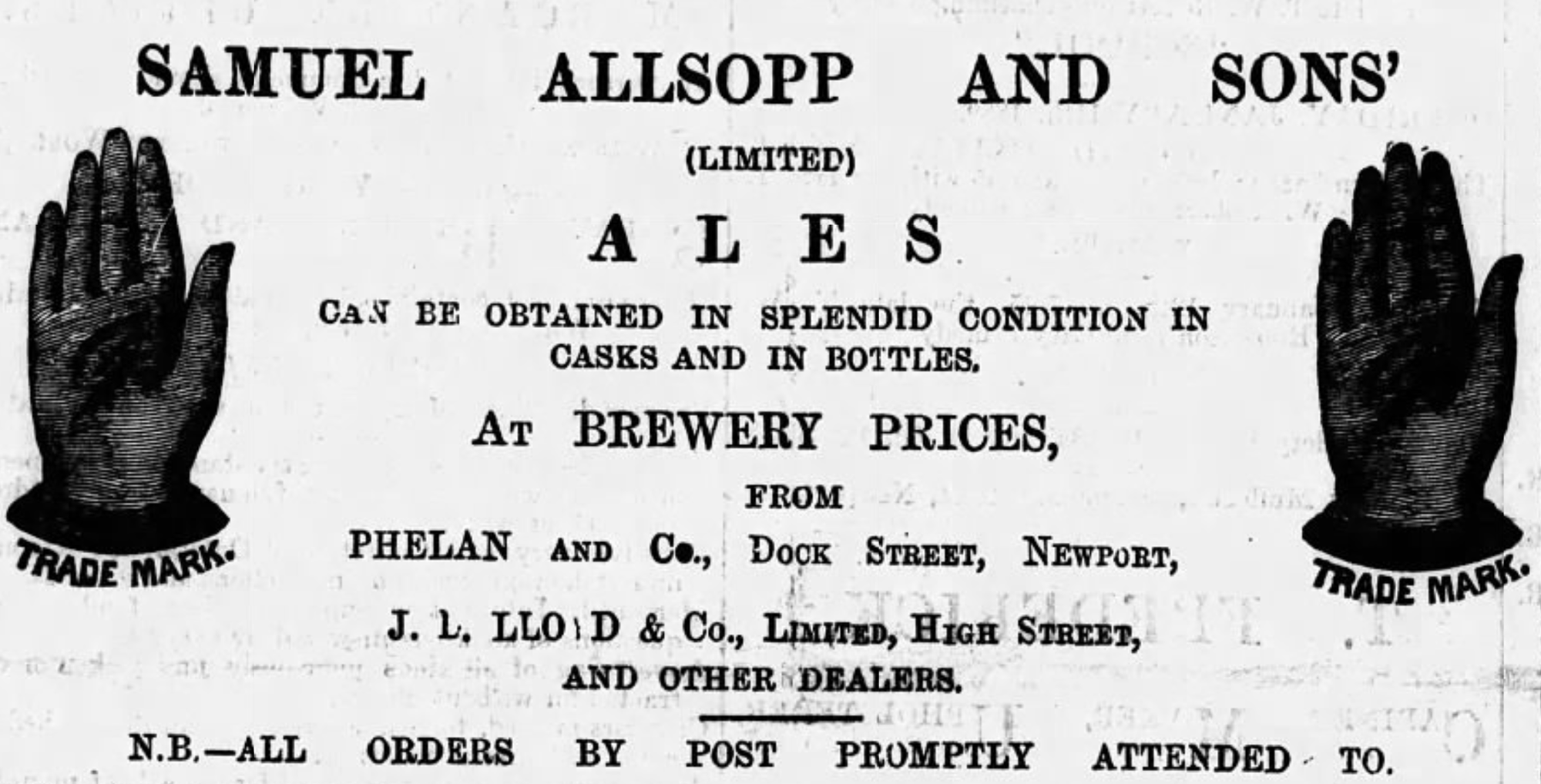

'Boat Hits Newport Bridge'
On Friday, the 15th instant, the parapet of Newport Bridge got an awkward thump, in the style of a battering ram, from the bowsprit of a vessel called the Lord Sandon some portion of the wall was knocked down, but no serious damage was done to the substantial part of the bridge. It is said that no blame attached, except to the rapidly flowing tide.
— Monmouthshire Merlin, 23rd December, 1843

'Stage Coaching: Dr. Rutherfoord Harris Sets an Example'
An article in the Western Mail in July, 1900 features a photograph of a coach called The Rocket which ran between Newport and Raglan, via Tintern Abbey every fortnight. Rather than being a mail coach, it was designed for people to travel on.
Here's a summary of the much longer article:-
In 1904, Dr. Rutherfoord Harris, the squire of Llangibby Castle, revived the romantic spirit of old-fashioned coaching by launching a new stagecoach service called The Rocket, running from Newport to Raglan and on alternate weeks to Tintern Abbey. The project aimed to offer leisurely, scenic travel through Monmouthshire’s countryside — a nostalgic alternative to the stuffy trains and crowded steamers of the modern age.
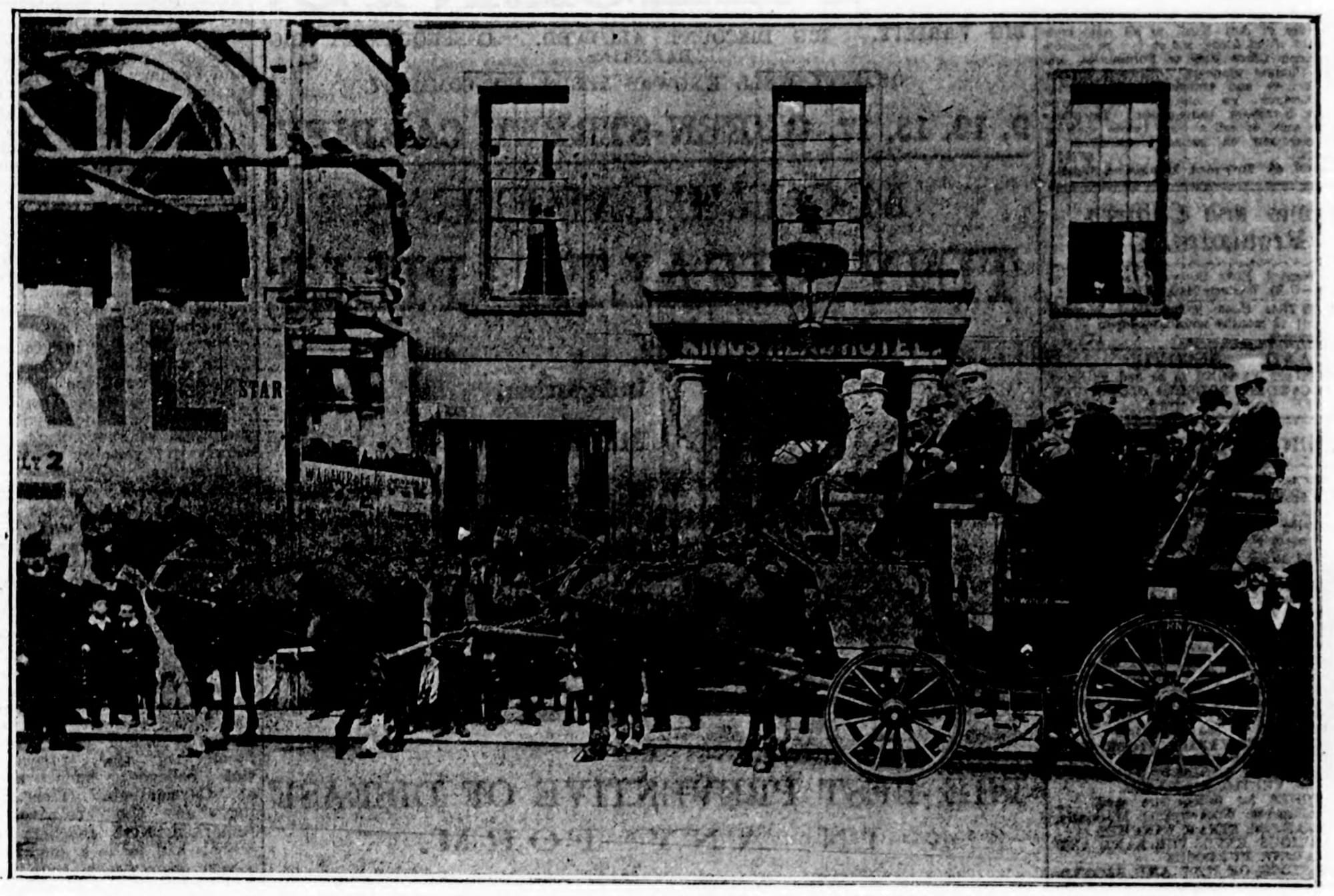
The coach, built by a leading London maker and painted in dark blue and gold, was based at the King’s Head Hotel, Newport. Its inaugural trip took place on a Saturday, with a party of invited guests and journalists travelling to Raglan. The route passed through Caerleon, Llangibby, and Usk, with horse changes and refreshment stops along the way. The coach was driven by Mr. R. W. Hatt, an experienced four-in-hand coachman, and accompanied by Mr. C. D. Phillips, son of one of Britain’s most noted coach drivers. The guard, Sam Boulter, entertained with tunes on his coach horn.
The outing was celebrated for its punctuality, fine weather, and beautiful scenery. At Raglan, the party dined at the Beaufort Arms Hotel, toasted Dr. Harris’s enterprise, and visited the castle ruins before returning to Newport in the evening — once again exactly on schedule.
The report concluded by calling the new coach run a delightful summer experience, reviving a bygone tradition of travel, and listing the service’s timetable for those wishing to “go a-coaching” themselves.
Timetable
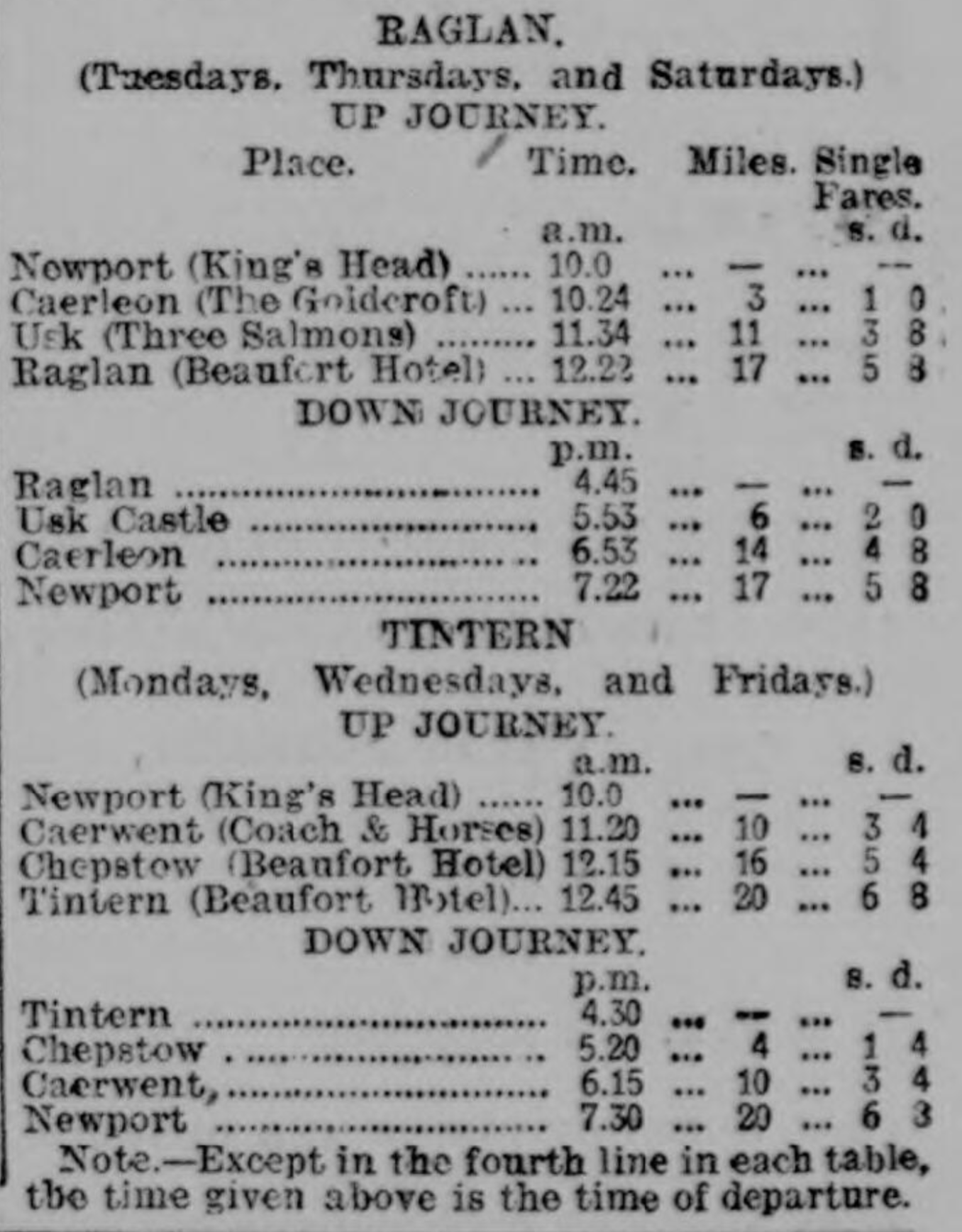

'1849 Magisterial Inspection of the Town's Beerhouses and Pill Area'
Were many of the beerhouses, or, indeed, the whole of them in Newport, subject to the same kind of supervision that the licensed public-houses are, it would doubtless be better for the morals of their customers; and productive of great benefits to the community at large.
A public-house which is badly conducted, not only gets heavy penalties imposed on its landlord, but is very likely to lose the license to continue such practices beyond another licensing day; but beerhouses, provided they are rated at £15 a-year, and contrive by strategy to make the police believe they are well-regulated, get fined but seldom, and are in no danger of losing their licenses, so long as the pension-draughted exchequer must be kept up by the beerhouse and other taxes.
Two of our active magistrates, T. Hawkins, and T. Hughes, Esqrs., paid a visit, on Monday last, to various public-houses, to satisfy themselves, in addition to the information derived from the "blue books" of the police, on certain matters best understood by those gentlemen on personal inspection. It is gratifying to understand, that generally speaking, few towns have better conducted inns; and this remark, with an exception or two, will most likely be borne out next licensing day.
The gentlemen named also visited the establishments of Mr. Parfitt, at the Dock, and Mr. Morgan, near the Western Valleys station, which are only selling under beer licenses at present; and also paid a visit to the intended establishment of Mr. James Howard, between the railway station and the new market. These houses are large and commodious, well-built, and raised at great expense; moreover, they are in localities where respectable houses of refreshment are now, and will more extensively be, required while the respectability of their possessors is some guarantee mat they will be conducted as such establishments should be.
There is, therefore, every probability they will obtain licenses at the next licensing court, due notices of application for which, we understood, are given. In addition to this visit of inspection, the magistrates also viewed the locale of improvements which are proceeding, or are about to proceed, in the neighbourhood of the Cattle Market. The new streets which are intended to be formed on all the spare ground adjacent to the Pill-road, received their attention; and several suggestions were made as to width, fall, &c. The facilities for drainage—an object heretofore so culpably neglected—were also remarked and the extensive main drain now being constructed by the Tredegar Wharf Company, at the back of the new market, was praised as the best piece of work of the kind yet begun in this town. This drain is of sufficient dimensions for all that part of the town—will have a sluice at the river side to admit the tide, which, when at its height, and filling the drain, will be dropped so that at low water, the sluice being raised, the main sewer will be purged of foul accumulations by the body of water thus rushing out. Such drains as these, extending up into the town, and supplied by back water as well, would soon change the character of Newport, in the vital points of cleanliness and health.
The plan for a new and capacious public slaughter-house at the back of the cattle market, was also discussed. This must meet very general approval; as we under- stand there will be copious drainage—a primary object in such erections; next, there will be its immediate proximity to the cattle market, lessening the necessity of driving cattle through the streets—avoiding the bullock-tossing perils to which the Cocknies are subjected—obviating in toto, the annoyance, danger, and difficulty of forcing animals down narrow lanes to slaughter-houses; with the paramount object of removing those pestilent nuisances from their propinquity to human habitations.
Then there will be the railway communication of the Western Valleys, and of the Pontypool in perspective, and also with the landing wharf on the bank of the river, from which, a new packet for Bristol, Ireland, &c., will land its cargoes of cattle, sheep, and pigs. The inspection of this place led to the consideration of another object: the pulling down of the present unsightly cattle market entrance on each side, and erecting light palisades on the right and left of the gateways, which, if the gates be altogether removed, and a temporary railing put up on either side of the market, would form a pleasant street-way from the Commercial-road to Dock-street, give the market more publicity, and not at all damage that excellent establishment.
It is said the Tredegar Wharf Company will not object to some such improvement of the place. A glance at the intended new malthouse being erected by Mr. T. F. Lewis, whose late premises have been purchased by the railway company, and at the site for the new Hope chapel, about to be begun in the same locality, together with the works of the railway stations, &c., and the places where drains ought to intersect so much important property, and the drains that do at present do duty in that quarter, completed the inspection of the magistrates, who, we know, take a deep interest in the progress and improvement of the town.
— Monmouthshire Merlin, 1st September, 1849


Window Smasher
Sarah Morgan was charged with breaking eight panes of glass on the Marshes road, belonging to the house of her brother-in-law. Ordered to make good the damage.
— Monmouthshire Merlin, 16th June, 1876
'Stealing Bacon'
John Heywood, the man of weak intellect," who was discharged from prison last Saturday, was charged on suspicion of stealing two pieces of bacon from tha market, on reaching Newport. There was no prosecutor.—He was discharged, but steps will be taken to send him to an Asylum.—Mr. Brown presented a paper to the Bench regarding this man. His case will be heard of again, as the Newport Union will object to being saddled with the expense of maintaining him.
— Monmouthshire Merlin, 16th June, 1876
'Obstruction on Stow Hill'
William Davies was summoned for obstructing Stow-hill. Defendant's trolly with a swinging beat was left standing at the bottom of Stow-hill for two hours on Tuesday morning. Ordered to pay 4s. 6d. costs, the Mayor advising defendant never to let his boat get aground again. (Laughters)
— Monmouthshire Merlin, 16th June, 1876
Female Vagrants
Margaret Pemberton and Mary Madden were charged with an act of vagrancy by sleeping in a shed at Barrack Hill, Newport.—Inspector Sheppard said great complaints had been made by the military authorities of the conduct of the prisoners. Permberton had been recently convicted of drunkenness. She was sentenced to three weeks' imprisonment, and Madden to one week.
— Monmouthshire Merlin, 23rd June, 1876
'Stealing a Lamb in Malpas'
William Richards was charged with stealing a lamb, the property of Edward Warren, a farmer, in the parish of Malpas. On Saturday evening last be missed one of his lambs, and could find nothing of it, but on Sunday he found one of the skins on his own grounds, partly torn to pieces by dog had seen the lamb sate on Friday. The skin was marked. Gave information to the police.
Tomlinson, solicitor, appeared for the prisoner, and cross-examined the prosecutor. In answer to Inspector Sheppard, Mr. Warren said he had seen the fore-leg of a lamb, which corresponded with the skin he had found. By Mr. Tomlinson Prosecutor knew he ought to have had 27 lambs. Prisoner lives about 200 yards from where he found the skin. Tbe skill had been taken off with a knife.
P.C. Hole, on receiving information of the theft, went in search, and in a shed in the occupation of the prisoner he found two legs of a lamb, one of which exactly corresponded with a portion cf the skin found on the ground. He took prisoner into custody on the charge, but he denied all knowledge of it.
Whilst bringing him to the station prisoner asked if Sergt. Povah went into the shed or not. Declined to answer the prisoner. In the shed he also found a handful of wool. There was an indication that the skin was hid in the hedge, that it had been brought out, and had been torn by dogs. The Bench regarded the evidence as inconclusive, and discharged the prisoner.
— Monmouthshire Merlin, 23rd June, 1876

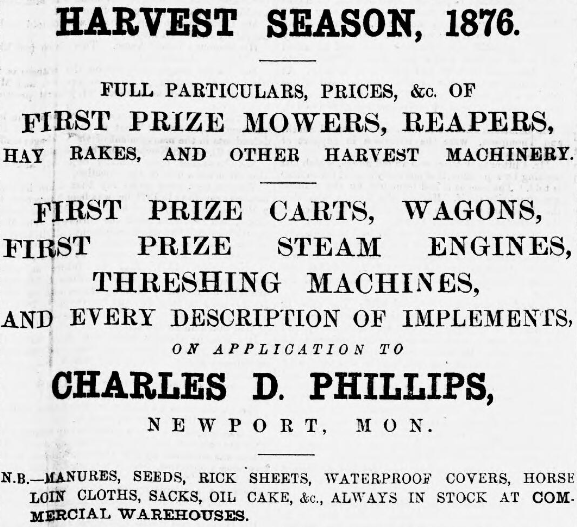

'Little Miss Nobody at The Lyceum'
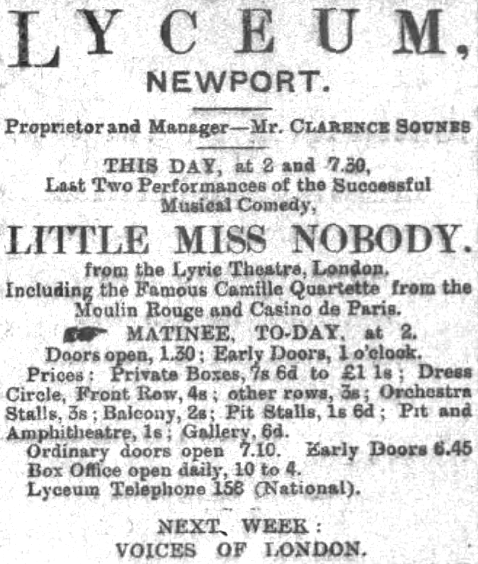
Little Miss Nobody, was a musical comedy in two acts, written by Harry Graham, with music by Arthur E. Godfrey and additional music by Landon Ronald, was produced by Tom B. Davis at the Lyric Theatre, London, on 14 September 1898. It ran for 200 performances, closing on 18 March 1899, before then heading to places like the Lyceum.


'Genteel Lodgings on Hill Street'

The house mentioned in this advert from the Monmouthshire Merlin from December 3rd, 1852 is no longer there but would have been in this approximate area (Talbot Lane wouldn't have existed then).
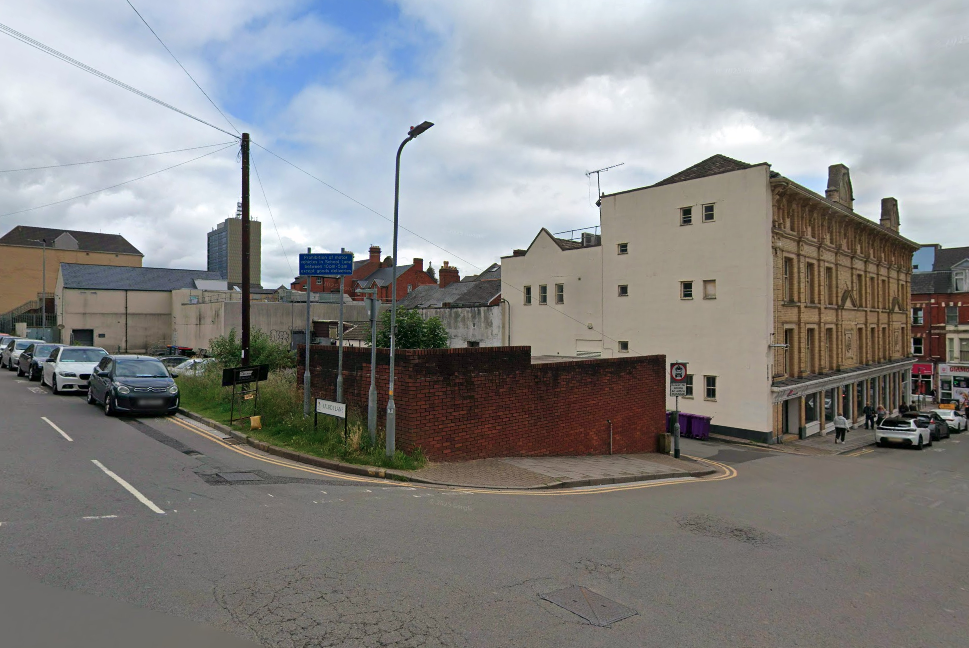

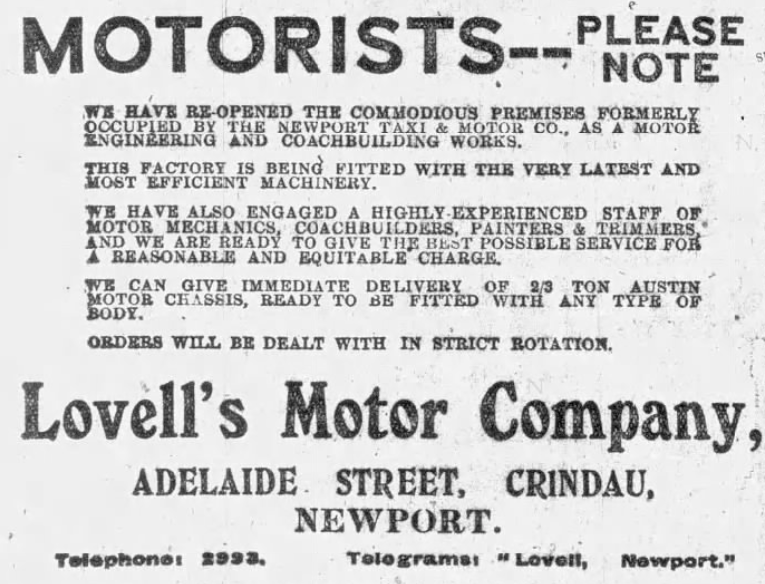

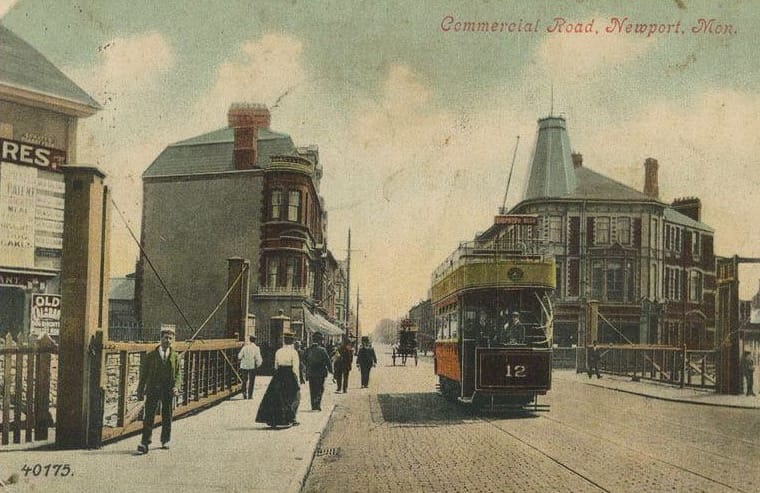

'What's On Sale At Cordey's in 1876?'
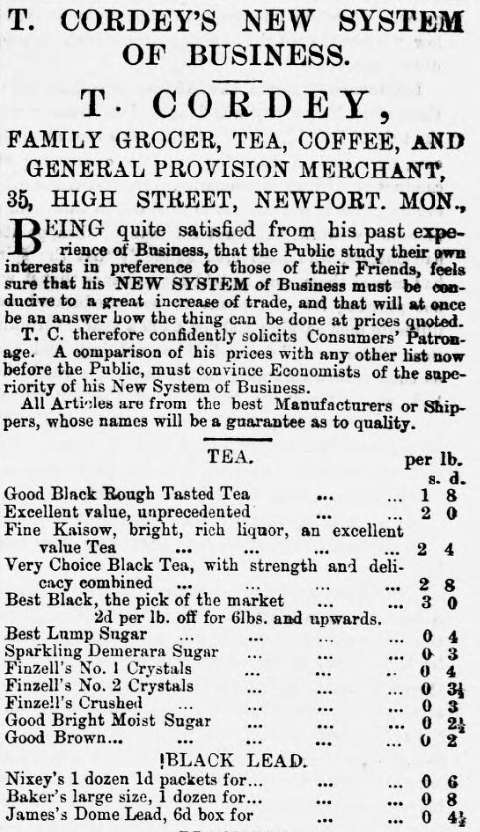
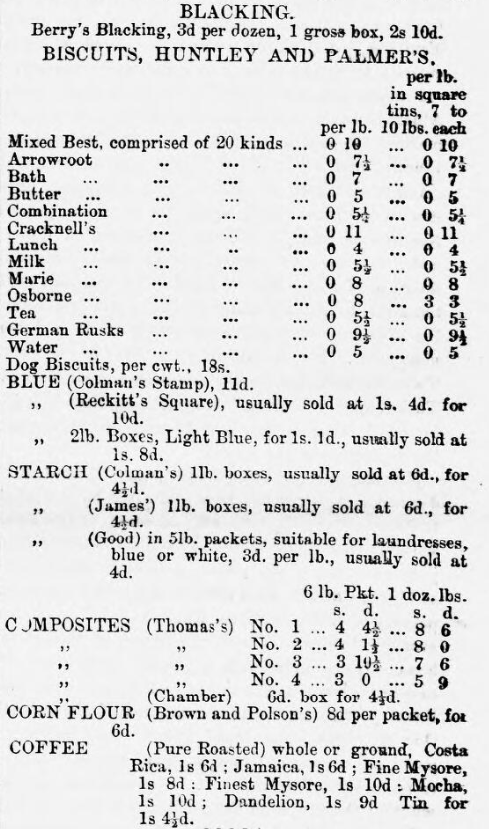
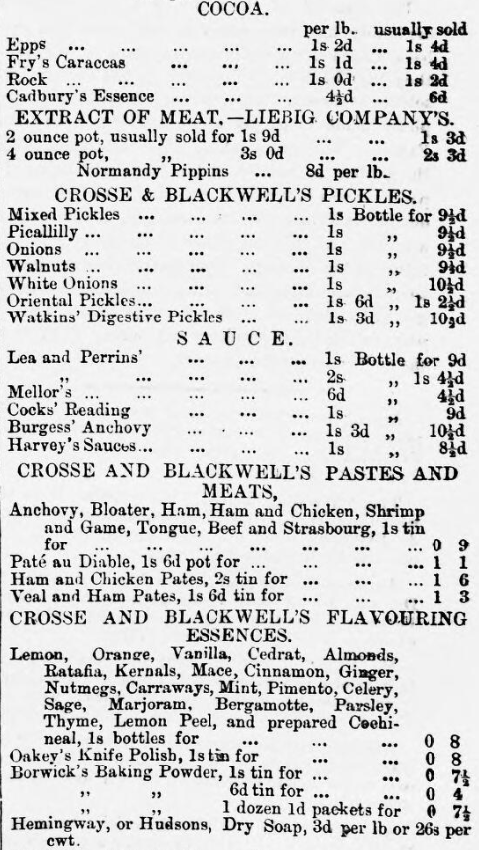
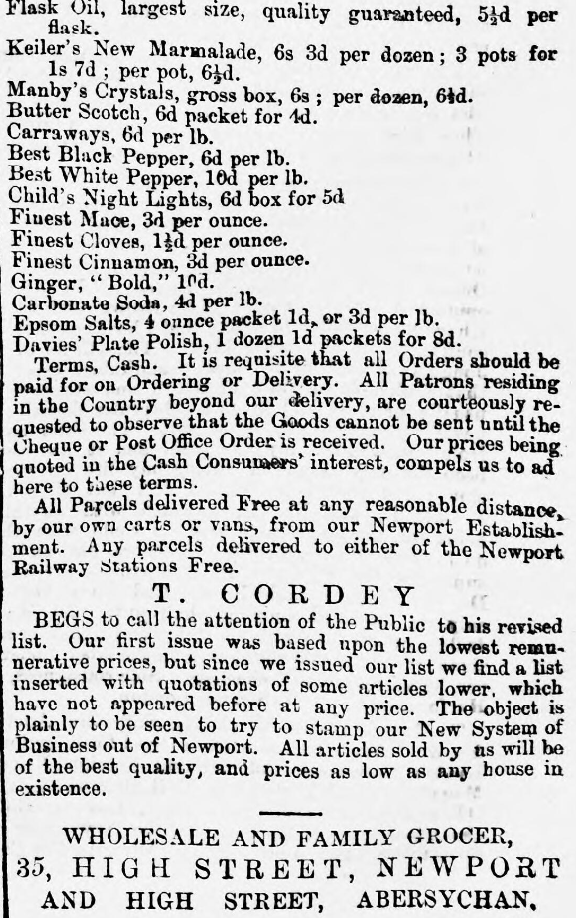

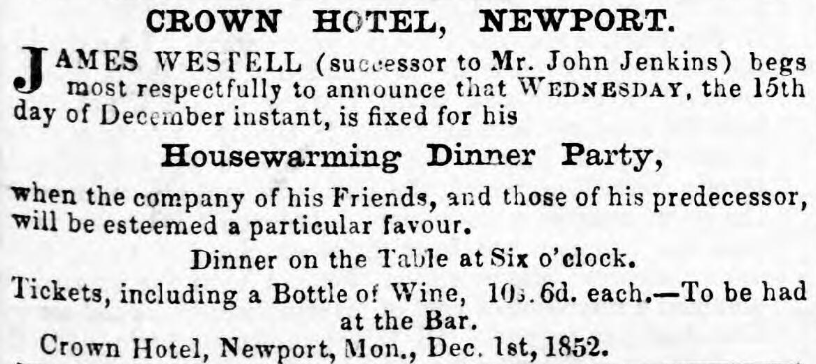

'Beef Stealer Transported for Second Time'
Thomas Day was indicted for stealing 3lbs of beef, at Newport, the property of Hugh Morgan, butcher, his master. Mr G. Somerset, was counsel for the prosecution. Miss Duckham saw the robbery and Mr. Morgan found the beef in prisoner's pocket. Prisoner told Sergt. Harlow he could not imagine how the meat got into his pocket! Guilty, but recommended to mercy by the jury. The prisoner then pleaded guilty to a former conviction, which the chairman said was an answer to the recommendation to mercy.
Independent of the present case, the prisoner had been thrice convicted of theft, besides minor offences; and moreover, he had been transported, but obtained a remission of part of his sentence, from good conduct. The chairman regretted all this punishment had produced no good effect on the prisoner, who must, therefore, be now transported for ten years.
— Monmouthshire Merlin, 3rd December, 1852

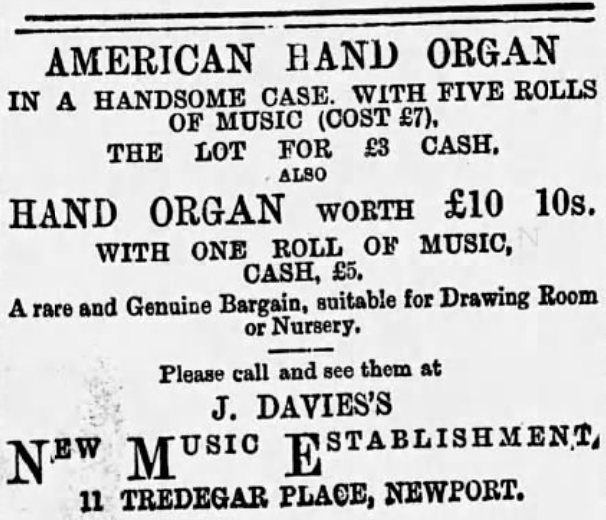

'Houses For Sale Near Hand Post'

On the tithe map of the early 1840s, this is marked as 'Two Houses and a Garden' so may be those or potentially across the road. Nothing remains of the houses.
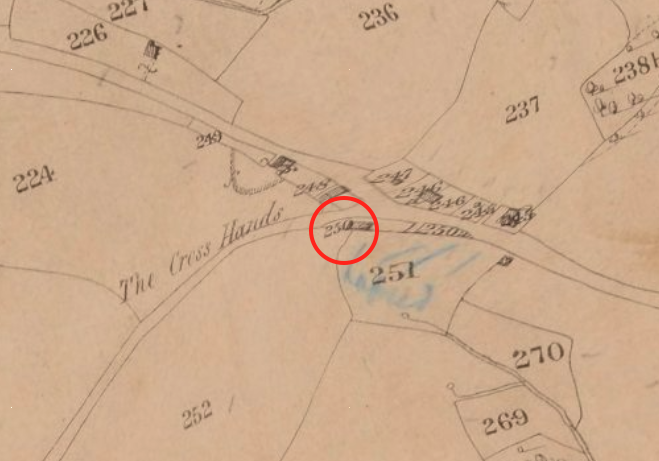

Fire in Cross Street
At four o'clock on Sunday morning, Police-Constables May and Kear discovered a fire in the bakery at the back of Mr Collins's shop, Upper Cross-street. The reel and hose were taken from the Albert Hall, and a quantity of water poured on the burning building. The fire was soon put out, but the bakehouse was destroyed. The origin of the fire is not known.
— Monmouthshire Merlin, 16th November, 1883
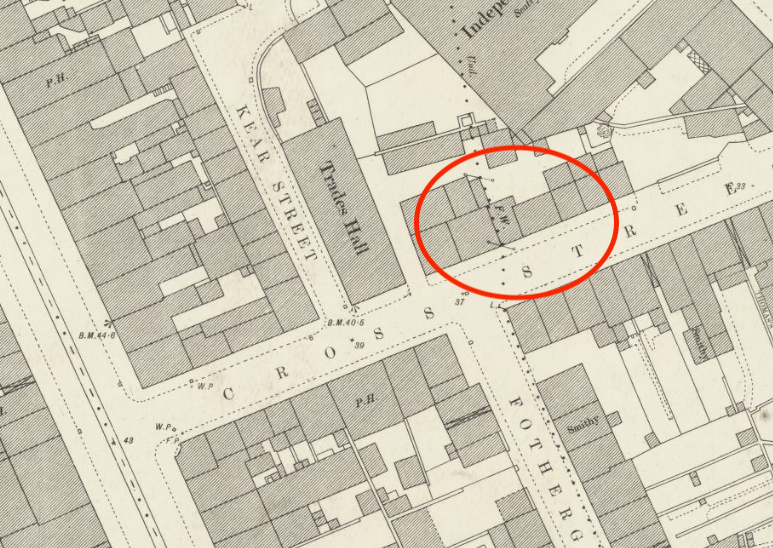
According to a street directory from the time, Mr Collins' shop is likely to have been in the area circled above.

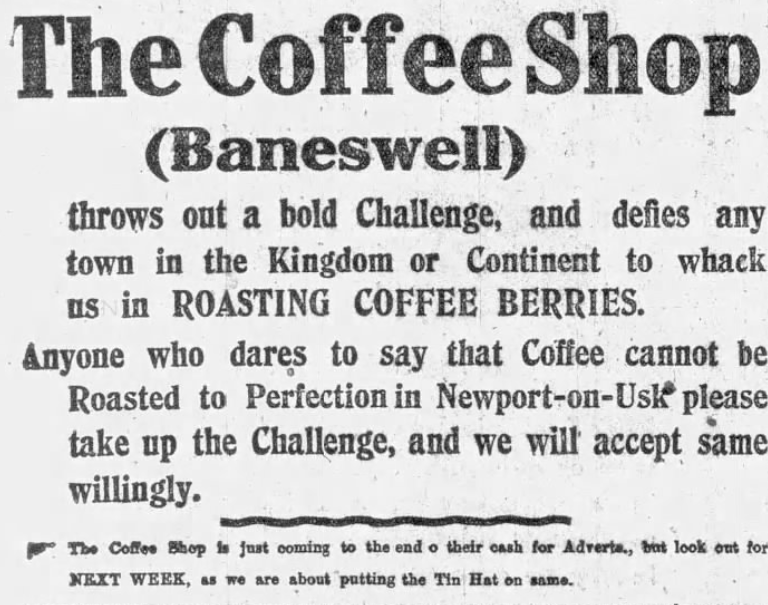

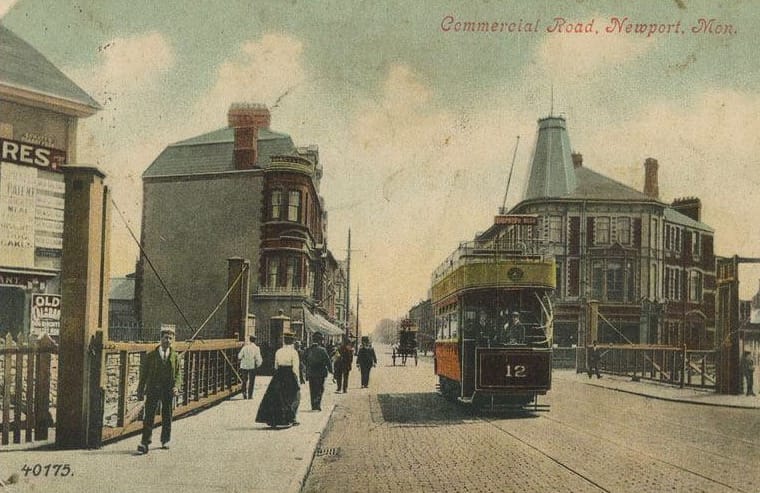
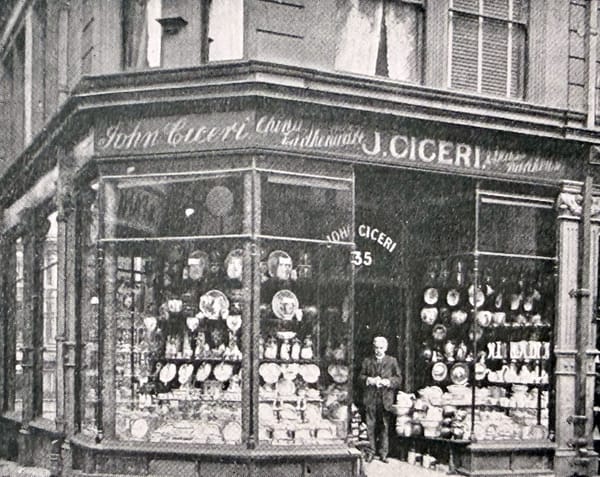
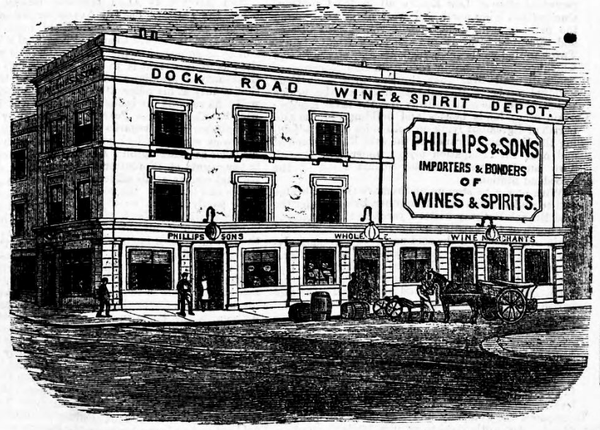
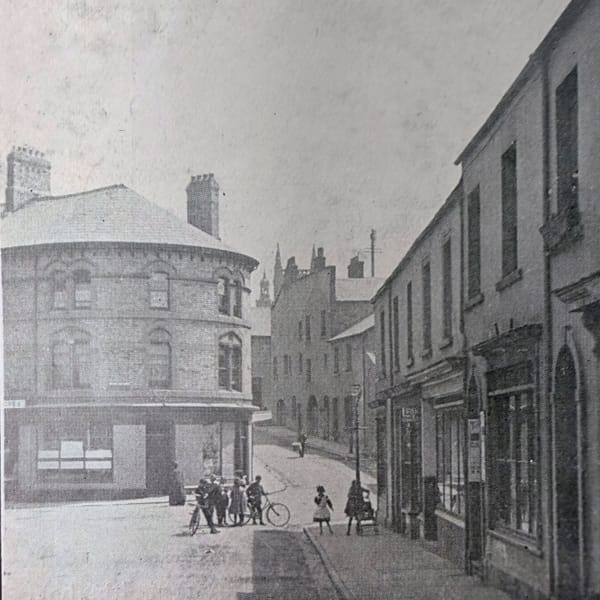
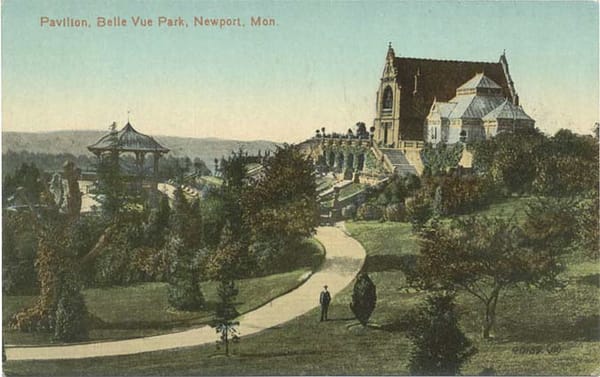
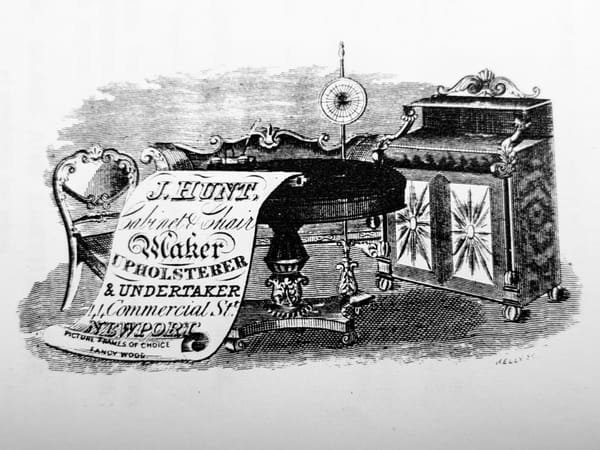
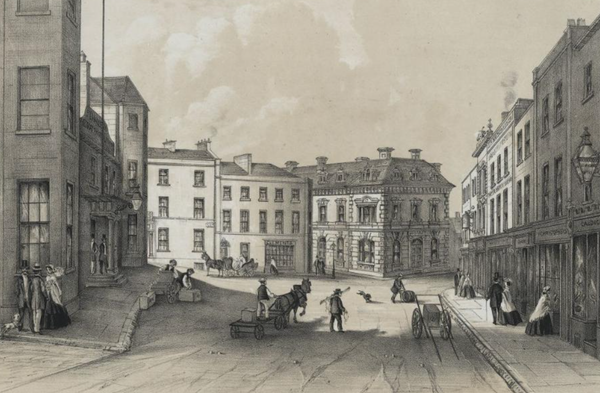
Member discussion